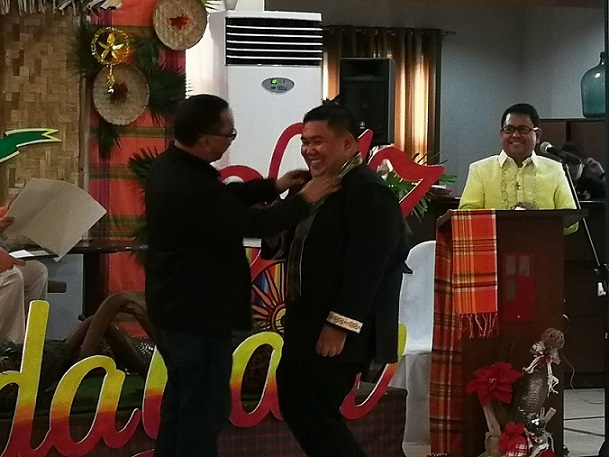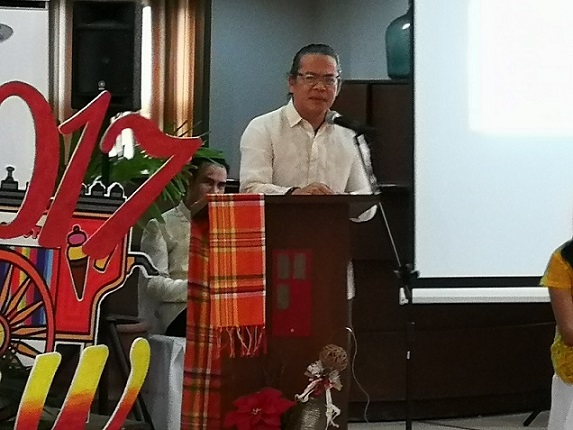
Whenever I tell people that I’m from Antique, the next question I usually get is “Where is that?”
I have developed a standard answer to that: It’s in Western Visayas, one of the four provinces that comprise the island of Panay : Aklan, Antique, Capiz Iloilo.
I do that in order that I would be spared the next question which usually is, “Is that, in Aklan? Or In Iloilo?”
Then I get asked, what’s the dialect there, Ilonggo? I say, Kinaray-a.
Without fail, the follow up question is, is that the same as Ilonggo?
Of course it’s not the same as Ilonggo.
Writer Alex de los Santos , author of the book, “The Rise of Kinaray-a”, said Kinaray-a is language spoken not only in Antique but mostly in West Visayas.
There’s a deeper historical and sociological aspects to Antique being mistaken as a town of Iloilo or Aklan and Kinaray-a being confused as similar to Ilonggo. There have been articles written about it. It should be a separate article.
There’s an organization Antiqueños called Dungug Kinaray-a whose advocacy is “to encourage the use of the Kinaray-a language through the promotion, collection, and preservation of the Kinaray-a literature, culture, and arts.”
Every year, it conducts a writing contest in Kinaray-a.
Dungug Kinaray-a’s website states that it advocates the philosophy that “Kinaray-a is neither better nor lesser than the other languages, and that it continues to become strong, deep, and lofty though the creation of new and the adoption of foreign words and concepts.” Literally translated as “Honor Kinaray-a,” Dungug Kinaray-a can also be construed as a feeling of pride when using Kinaray-a.

It gives a background of the group : “While a good amount of Kinaray-a written literature was produced during the last 30 years, those materials were not collected and preserved so that researchers and those who wish to study the language may easily access them. Except for a select few that had been published with support from the Cultural Center of the Philippines and National Commission for Culture and the Arts, many literary writings in Kinaray-a were left unpublished, unread, or forgotten.
“Reversing this situation became a personal mission for Ritchie D. Pagunsana, a Karay-a who thought it was time his native language is given the recognition it truly deserves. Thus, on May 5, 2006, Pagunsan, together with other like-minded Karay-a, founded Dungug Kinaray-a, a private and not-for-profit organization that celebrates the Kinaray-a language and seeks to promote, gather, and preserve the Kinaray-a literature.
“This personal mission soon became a collective mission. Among the writers and artists who shared in this collective mission included Maria Milagros C. Geremia-Lachica, Ma. Felicia M. Flores, Glenn Sevilla Mas, Emmy L. Masola, Linda C. Arnaez-Lee, Consolita V. Rubino, Arlene D. Nietes-Satapornvanit, Bernie L. Salcedo, and Manuel E. Magbanua, Jr. Geremia-Lachica and Flores are considered among the first writers in contemporary Kinaray-a. “
This year’s competition had three categories – Poetry, Children’s Story and Short Story and generated 45 entries according to Fr. Danny S. Tabuyan, who chaired the committee. Awarding ceremonies were held last Dec. 21 at the Pinnacle Suites in San Jose, Antique. The winners were:
Binalaybay (Poetry)
First Prize: “Ang Inggat kang mga Bitoon kon Silawon Halin sa mga Lobot kang Amun Atup nga Nipa” by Dax G. Dequito of Oton, Iloilo
Second Prize: “Gisi nga Handum” by Julbert R. Paloma of San Jose de Buenavista, Antique
Third Prize: “Mga Ingus kag Ogayung kang mga Tinaga” by ni Reyson P. Samulde of San Jose de Buenavista, Antique)
Sogidanun Pangbata (Children’s story)
First Prize: “Si Mata kag Ana mga Abyan” by Reyson P. Samulde
Second Prize : “Ang Bolan kag ang mga Bitoon” by Edison M. Otañes, Sibalom, Antique
Third Prize: “Akasya” by Mirah Day A. Ballarta of Belison, Antique
Bugu nga Sogidanun (Short Story)
First Prize: “Ang mga Haron kang Nagriligad” by ni Julbert R. Paloma
Second Prize : “Ogis nga Sarong” by Charisse O. Joting-Quiman of Bugasong, Antique
Third Prize: “Where do broken hearts go nga ba, Tita Whitney?” by Alyssa Jude M. Montalban of Cabatuan, Iloilo
The winners received P10,000 and medal for first prize; second prize P7,000 and medal; and third prize, P5,000 and medal.
De los Santos, who was the guest speaker, said no doubt, they have achieved a lot in promoting Kinaray-a in print and in the internet. But there’s the challenge of having a standardized orthography that they have to face.
De los Santos himself has disagreements with Dungug Kinaray-a on orthography but it is a demonstration of their broadmindedness that they are willing to talk and resolve the issue.
Congratulations to the winners and to Dungug Kinaray-a. May your tribe increase.
Technology is one of the culprits responsible for the extinction of Filipino languages/dialects. Experts say promoting the literature of a language/dialect ensures its survival and endurance. Strike back and use technology to promote Kinaray-a and other dialects: always text and email in your mother tongue as much as possible.